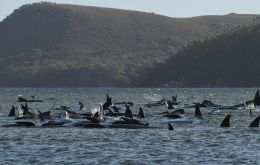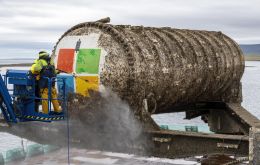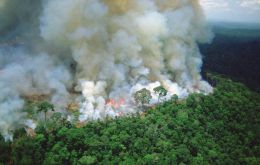MercoPress. South Atlantic News Agency
Environment
-
Tuesday, September 29th 2020 - 09:55 UTC
Brazilian farmers' lobbies divided over EU complaints of Amazon deforestation

Brazil's biggest lobby group for soy farmers Aprosoja has broken ties with the Brazil Agribusiness Association (Abag) over its support for an initiative calling on the Brazilian government to rein in soaring deforestation in the Amazon rainforest.
-
Tuesday, September 29th 2020 - 08:39 UTC
California wildfires rage renowned vineyards in Napa and Sonoma counties

A wind-driven wildfire raged for a second day through Northern California wine country on Monday, burning homes, forcing thousands of residents to flee, and threatening some of the world-renowned vineyards of Napa and Sonoma counties.
-
Monday, September 28th 2020 - 09:03 UTC
Amazon forest Chief blasts Bolsonaro for blaming wildfire on tribes: “that is a lie”

Chief Raoni Metuktire, one of the most iconic defenders of the Amazon, condemned Brazilian President Jair Bolsonaro for blaming wildfires devastating the rainforest on indigenous people.
-
Friday, September 25th 2020 - 08:36 UTC
Grim experience for Australian authorities, euthanizing and disposing of some 400 whale carcasses

Australian officials were focusing on the grim task of disposing of almost 400 whale carcasses on Thursday, while attempts to rescue the few remaining survivors of one of the world’s worst mass strandings were expected to extend another day.
-
Wednesday, September 23rd 2020 - 08:54 UTC
EU/Mercosur trade deal ratification delay: Brazil accuses France of “protectionist interests”

Brazil hit back Tuesday at European reluctance to finalize a trade deal between the EU and Mercosur blocs over concerns about Amazon deforestation, saying a French report on the issue was motivated by “protectionist interests.”
-
Tuesday, September 22nd 2020 - 08:22 UTC
A third of some 270 pilot whales stranded on Tasmania sandbar have died

Rescuers were trying to refloat hundreds of whales stranded on a sandbar off the remote west coast of the Australian island of Tasmania on Tuesday, hoping to end one of the country’s worst beaching events.
-
Monday, September 21st 2020 - 08:27 UTC
Group of world's largest corporations call to support nature and fight climate change

Some of the world's biggest companies on Monday backed growing calls for governments to do more to reverse the accelerating destruction of the natural world and support broader efforts to fight climate change.
-
Thursday, September 17th 2020 - 09:10 UTC
Eight EU countries urge “real action” from Brazil to combat deforestation

A group of eight European countries urged Brazil to take “real action” to combat rising deforestation in the Amazon rainforest, which is threatening Europe’s desire to source food and other products sustainably.
-
Tuesday, September 15th 2020 - 09:50 UTC
Huge calving at the Arctic ice shelf: the massive chunk is larger than Paris

A massive chunk of ice - larger than the city of Paris - has broken off from the Arctic's largest ice shelf because of warmer temperatures in Greenland, scientists said on Monday. The 113 sq km block broke off the Nioghalvfjerdsfjorden glacier in Northeast Greenland, which the scientists said had been expected given the rising average temperatures.
-
Tuesday, September 15th 2020 - 09:19 UTC
Ecological disaster: fires destroying Brazil's wetlands suffering the worst drought in 47 years

Fires are raging in the wetlands of west-central Brazil, leaving behind a vast swath of charred ruins in a paradise of biodiversity. The enormous fires have destroyed nearly 12% of the world’s largest tropical wetland, partially reducing to ashes one of the most biologically diverse ecosystems on the planet.
